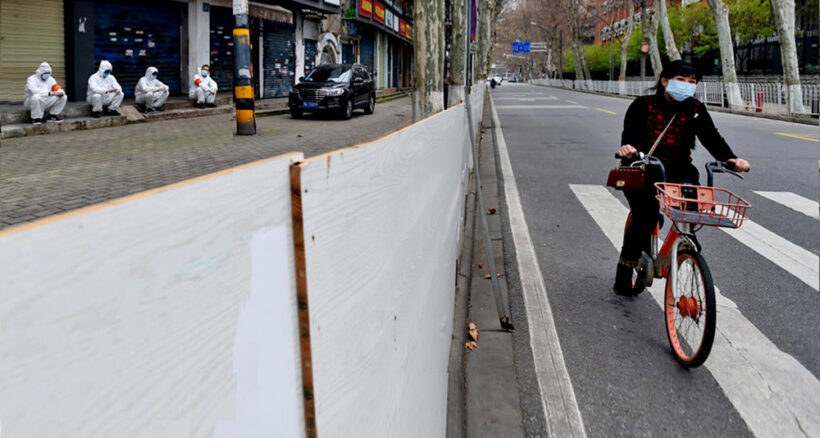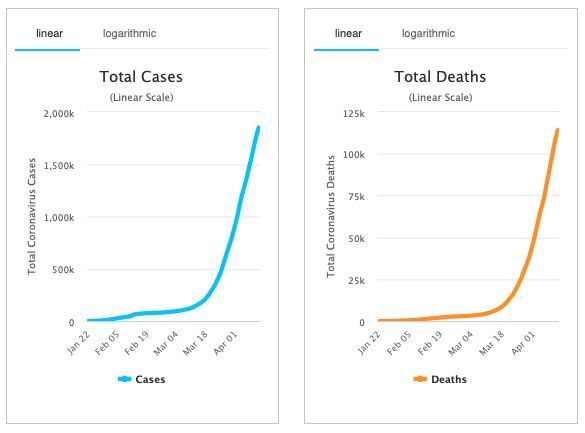The road back to ‘normal’ – when can we get back to work?

OPINION
At one stage we didn’t know a new coronavirus was about to emerge. Then we started hearing stories out of China about a mysterious pneumonia-like disease in the first week of 2020. Then we started seeing a surge of cases, outside China, and wondered if it would affect us and the way we live. Then it did. Now we’re somewhat in the middle of the worldwide Covid-19 pandemic.
Despite plenty of ‘I told you so’ moments from pundits, the Covid-19 crisis has been a sucker-punch, and caused a swift and sudden interruption to our daily routines.
Most of the business-world is on hold, many people have lost their jobs or are waiting in hope that they can resume work at some stage. People’s lives have been turned upside down and entire communities are waiting out the pandemic in the relative safety of their homes. Others become infected. And some die.
Around the world the total of Covid-19 cases will push through the 2 million mark during the next day. The number of deaths has reached 120,000. At this stage, worldwide, there is no sign of a “flattening of the curve”.

But how long can we keep the world economy on hold? How long until governments look at the bottomline and worry about how long it will take to dig themselves out of the massive recession that will follow? Remember, all this money the world’s governments are handing out to citizens, or to prop up businesses, will have to be paid back at some stage.
“Although the downturn is predicted to be short-lived, it’ll take time for economies to make up the lost ground. Even with unprecedented levels of monetary and fiscal stimulus, gross domestic product is unlikely to return to its pre-crisis trend until at least 2022.” – Bloomberg
Unless you own a supermarket, work for a delivery company, or own an online business, you’re probably on an unplanned, extended break.
The world’s largest economy is currently neck deep in the coronavirus swamp as cases are still on the rise, despite the US President’s best intentions to re-open businesses for Easter. The country currently has 587,000+ cases and 23,644 deaths from the virus (as of Tuesday night Thai time) with a peak in cases still somewhere down the track.
Despite that, there are loud voices advocating an urgent return to work, in the US and elsewhere. The US economy, fragile at best before the arrival of Covid-19, will be in a deep recession for months, perhaps years. The US economy’s return to relative health will be an important beacon of confidence for economies around the world.
Whilst scientists are wrestling with the data to follow coronavirus transmission trends, understand the contagion and recommend treatments, the best solution they’ve been able to come up with is social distancing. Just stay away from other people. That social distancing has not only locked down communities but virtually locked down the world economy. It’s the blunt and necessary tool that is effective in limiting the spread of Covid-19.
But academics are split on exactly when to send people back to work. The longer the world is holed up at home, the longer and deeper the economic pain. But if people are allowed to return to work and start ‘mixing’ again too soon, there will be more deaths, and more potential for another outbreak. That will mean a lot more economic pain in the long-run.
If governments had done nothing at all the result would have been catastrophic. Entire medical systems would be overwhelmed and the death tolls would be devastating.
But the temptation to get people back to work and fire up the world economies is great. It will happen at some stage, it must happen, but how and when? And how confident will people be to walk into the brave new post-coronavirus world knowing that the virus is still lurking.
To be clear, NOTHING will be the same when we emerge from this farrago. There will be no magic day when the clouds part, the sun shines brightly in the sky and Curly sings “Oh what a beautiful morning”. The return to anything remotely ‘normal’ will be patchy and slow.
“The coronavirus pandemic is set to rob the global economy of more than $5 trillion of growth over the next two years, greater than the annual output of Japan.” – Bloomberg
The Covid-19 virus is not going to stop just because we’ve reduced the number of new daily cases. Covid-19 is now with us, forever, and the best we can do is manage new outbreaks as they pop up in localised communities. This will be the ongoing scenario until an effective, viable and safe vaccine can be developed. There will be second and third waves of outbreaks around the world. Take your foot off the peddle of social distancing protocols too quickly and the waves will come faster.
Consider that only in the last week or so have any sizeable numbers of cases emerged in South America. Outbreaks in India and Africa are in their early phases with experts projecting potential disasters for less developed countries. Russian cases are now starting to become statistically significant with a 15% increase in the past 24 hours alone.
The road back to ’normal’ will likely involve an entire new set of social conventions that will allow us to start working and travelling again, but with prevention and protections in place to limit the number of new infections or new outbreaks. That’s likely to remain, at best, ‘inconvenient’ and a long way from the normal we used to enjoy.
Many businesses have tried to keep the wheels turning by getting creative and using internet tech to allow their staff to work from home. It’s worked, in some businesses and even schools moving their classes online. Companies like Zoom have become overnight video-conferencing stars because of the demand for reliable video connectivity. But it doesn’t work for plenty of other businesses. Indeed those of us that have tried to use video conferencing will understand this video only TOO well…
Manufacturing has been hard hit, mostly shuttered around the world. The retail sector, other than supermarkets and pharmacies, has been closed for weeks. Some have moved sales online, others may never open their doors again.
All those grounded planes aren’t all going to take off Day One full of passengers travelling across the world either. It will likely take more than a year for even some of the airlines to get their schedules back up to speed. Some airlines will never fly again. Not all countries are going to open their borders at the same time. Other may have to close their borders again as a second wave of the virus emerges. The sheer cost of getting grounded planes safely back up into the sky will be a financially crippling prospect for struggling airlines.
The problem with the aviation industry is it relies on lots of people crowding into airports, sitting inches away from each other for hours on end, and travelling from one country to another – the perfect transport mechanism for an ambitious virus.
The issue confronting us all is that there is no instant and easy way forward from this point. Governments around the world will try and get their economic engines running again, some sooner, some later, some acting more cautiously than others. There will be successes and there will be new outbreaks.
The one thing you don’t want to be at the moment is a tourist destination relying mainly on tourist cash to keep your local economy running. Tourists with disposable cash will be thin on the ground for a while.
The only magic pill is a safe, reliable and available vaccine. At this stage, that is unlikely to happen this year.
Stay safe.
Latest Thailand News
Follow The Thaiger on Google News:


























